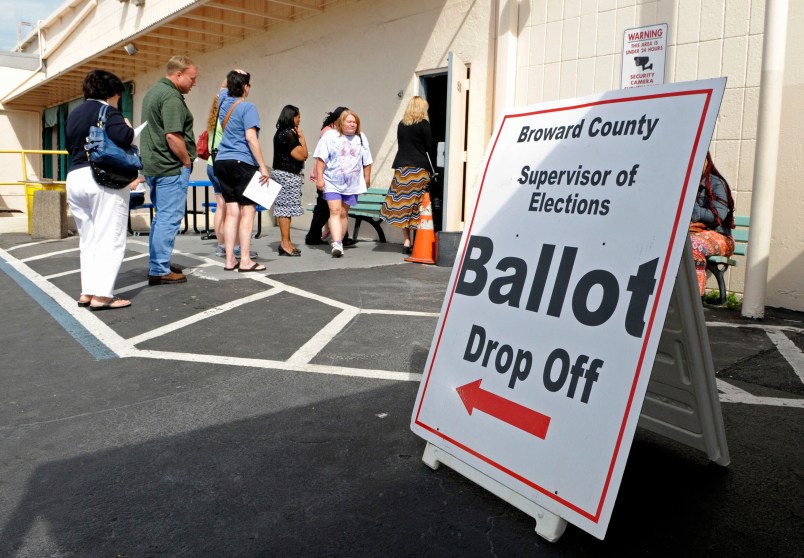Florida voters will decide this November whether to restore the voting rights of the vast majority of about 1.7 million Floridians with felony convictions who have completed their sentences.
The Orlando Sentinel first reported Tuesday that Floridians for Fair Democracy, led by Desmond Meade, had successfully gathered more than 799,000 certified signatures to get the issue on the ballot, surpassing the necessary threshold by tens of thousands and counting. The measure wouldn’t affect those convicted of murder or sexual offenses, the Sentinel noted.
“The moment I found out, tears just started streaming down my face,” Meade told the paper. “As someone directly impacted, I cannot quantify the level of emotion moving through me right now.”
Floridians make up roughly a quarter of all Americans who have permanently lost their right to vote due to a past felony conviction, according to the ACLU.
The group was one of several to support Florida’s Voting Restoration Amendment. An ACLU press release Tuesday read: “Florida has the most restrictive policies in the nation with respect to limiting the ability to vote for citizens who have paid their debts to society. It is one of only four states with a lifetime ban on voting. Current law outlines a long and difficult process to restore an individual’s ability vote.”
In addition to Florida, Kentucky, Virginia and Iowa permanently bar convicted felons from voting unless they are granted clemency, ThinkProgress noted. In May last year, comedian Samantha Bee highlighted the arduous process by which those Floridians with felony convictions can attempt to regain their rights — it rarely works.
The law as it stands deeply affects communities of color: More than 21 percent of African American adults in Florida have lost the right to vote due to a felony conviction, according to the Sentencing Project, compared to 10 percent of the state as a whole.
“People believe in forgiveness, redemption, restoration and, ultimately, second chances,” Christian Coalition of Florida Chairman Ash Mason said, as quoted by the ACLU.
The measure needs support from 60 percent of the state to amend Florida’s constitution.
Meade told the Sentinel that while nearly 800,000 signatures had been certified, more than 1.1 million had been gathered total “and petitions are still pouring in.”
He posted a triumphant video to Facebook Tuesday morning:
This post has been updated.







“Florida, Kentucky, Virginia and Iowa permanently bar convicted felons from voting”
And we all know why. #NOBODYSFOOLED
So, working exactly as designed, eh?
“People believe in forgiveness, redemption, restoration and, ultimately, second chances,” Christian Coalition of Florida Chairman Ash Mason said, as quoted by the ACLU.”
It’s good to see the Christian Coalition be actually Christian for a change instead of being a repository for grifters like Ralph Reed.
Hopefully their members take heed and vote for this.
What a two-fer, just implement discriminatory conviction processes and the state constitution moves voting rights backward on auto-pilot, slowly to their coveted 19th century civil rights.
I think states absolutely have a right to restrict the franchise as part of the penalty for committing a serious crime (although I think it’s pretty clear why most states restrict this, and it’s by no means innocent).
But I think keeping vulnerable (both in recidivism and in socioeconomic status) citizens actively engaged in the smooth and effective functioning of their society is key to reducing those vulnerabilities. The right to vote is not just a right, it is also a tool.
Here’s hoping Floridians see it that way.